Love & Communication in Intimate Relationships
Love means something different to everybody, but the general definition is that love is accompanied by a special attitude with behavioral and emotional components that create a deep feeling of affection. There are six types of love we see in society which are nonlove, infatuation, empty love, fatuous love, romantic love, and consummate love. Before we can understand the six types of love, it’s important to understand what passion, intimacy, and commitment are. Passion fuels romantic, physical, and sexual feelings, however intimacy includes the sense of a bond that’s open to private conversations. Commitment is a cognitive aspect of love that must be carried out by all those involved in the relationship.
Nonlove is defined as what most of us feel towards casual acquaintances while infatuation lacks intimacy and commitment but has passion. Empty love can be seen when there is commitment without passion whereas fatuous love has both passion and commitment without any intimacy. Romantic love contains both passion and intimacy but lacks commitment, however consummate love has all three components present and is the fullest kind of love that most people strive for but have difficulty sustaining.
Psychologist John Lee, most known for Lee’s Styles of Loving, hypothesized that relationship success is influenced by the compatibility in styles of loving that develop over time. Lee further explained that success in loving relationships means that one has found a mate who shares a similar approach to loving with the same definition of love. Regardless of which style of loving you are, there are five known ingredients to a lasting, loving relationship. To start, self-acceptance and acceptance of your partner(s) is vital. Following this, showing appreciation to each other as well as commitment helps foster a loving relationship. Good communication, realistic expectations, and shared interest are vital as well as equality in decision making. Lastly, lasting relationships need the ability to face and deal with conflict that will arise.
The characteristics of high quality relationships include supportive communication, companionship, sexual expression and variety, seeing your partner as your best friend, and maintaining frequent positive interactions. Sexual variety is important because it allows those within the relationship to talk about their desires, needs, and feelings while avoiding routine times and places.
